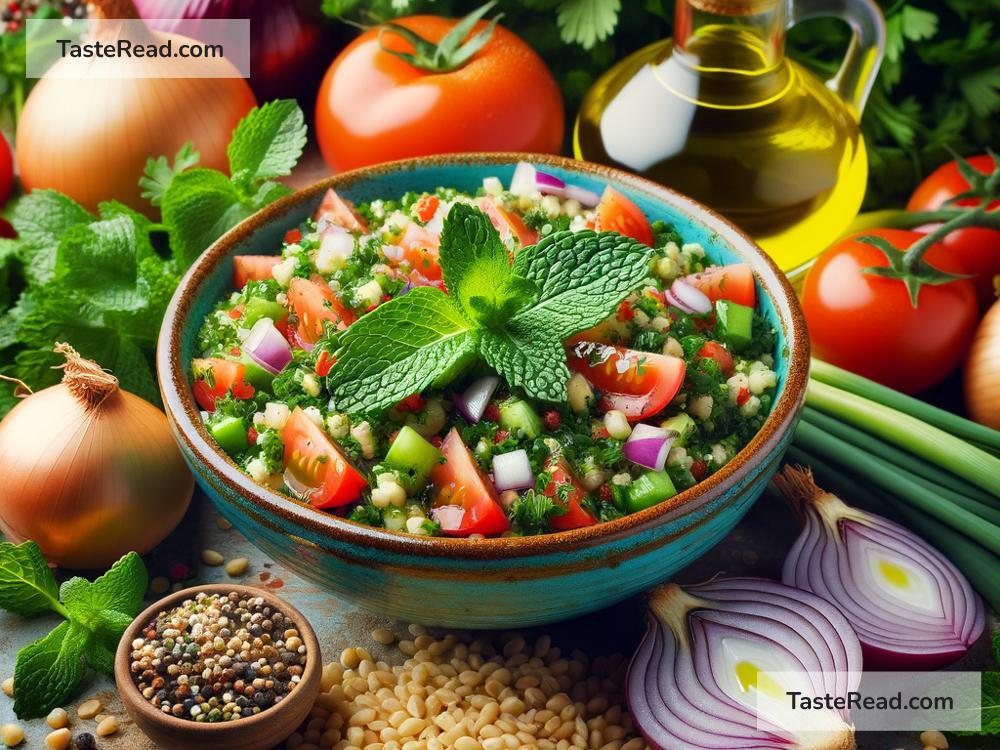Exploring the Origins of the Lebanese Tabouleh
Tabouleh, a refreshing and zesty salad often greeted with delight at gatherings, has its roots deeply embedded in Lebanese culture. This traditional dish, known for its vibrant flavors and healthful ingredients, captures the essence of Lebanese cuisine, making it not only a local favorite but also beloved by people worldwide. But have you ever wondered where and how this delightful salad originated? Let’s take a journey through time and explore the origins of Lebanese Tabouleh.
A Historical Blend of Ingredients
Tabouleh is a simple yet sophisticated dish, made primarily from finely chopped parsley, tomatoes, mint, onion, bulgur (cracked wheat), and dressed with olive oil, lemon juice, salt, and pepper. Each ingredient plays a vital role, contributing its unique taste and texture, resulting in a salad that’s both nutritious and delicious.
The origins of Tabouleh can be traced back several centuries in the Middle East, with Lebanon being widely recognized as the birthplace of this dish. It’s believed to have been a part of the diet of the mountains’ inhabitants in Lebanon and Syria, who had mastered the art of cultivating parsley, mint, and other key ingredients.
A Symbol of Cultural Identity
In Lebanese culture, food is more than just sustenance; it’s a celebration of heritage and communal bonding. Tabouleh, in particular, has transcended its status as a mere side dish to become a symbol of Lebanese identity and pride. Its preparation and consumption are integral to family gatherings, religious festivities, and social events, representing the loving labor and warm hospitality that are hallmarks of Lebanese society.
One of the beauties of Tabouleh is its versatility. While the core ingredients remain the same, variations exist from one region to another, and even from one family to another, each adding their personal touch to this cherished recipe. Some might add more lemon juice for extra tanginess, while others might incorporate pomegranate molasses for sweetness and depth. This adaptability has allowed Tabouleh to weave itself into the fabric of Lebanese culture, resonating with the diverse tastes and preferences of its people.
Tabouleh Goes Global
The Lebanese diaspora has played a significant role in spreading the love for Tabouleh far beyond the country’s borders. Lebanese immigrants, carrying with them the recipes of their ancestors, introduced Tabouleh to new lands, where it was embraced with enthusiasm by people unfamiliar with Middle Eastern cuisine. Today, Tabouleh can be found in restaurants and households around the globe, serving as a delicious ambassador of Lebanese culinary tradition.
Its international recognition is not only a testament to its wide appeal but also to the global appetite for healthy, flavorful dishes. Tabouleh fits perfectly into the modern culinary zeitgeist, emphasizing fresh, whole foods and plant-based ingredients. It has found a place in the hearts of health-conscious eaters, vegetarians, and those simply looking for a taste of Lebanon’s rich culture.
A Testament to Timeless Tradition
Creating an authentic Lebanese Tabouleh requires dedication and attention to detail. The parsley must be finely chopped, a task traditionally done by hand with a sharp knife, a labor of love that imbues the dish with care and intention. The proportions of ingredients must be balanced, ensuring that no single flavor overpowers the others, but rather, they harmonize to create a symphony of taste.
While the methods and tools may have evolved, the essence of making Tabouleh remains unchanged. It’s an act of preservation, keeping alive the culinary practices passed down through generations. Every bowl of Tabouleh is a tribute to the resilience and creativity of the Lebanese people, a celebration of their ability to create something beautiful and nourishing from the simplest of ingredients.
Conclusion
The origins of Lebanese Tabouleh are a testament to the enduring power of food to tell stories, connect communities, and transcend boundaries. More than just a salad, Tabouleh carries with it the spirit of Lebanon — its history, its people, and its heart. Whether enjoyed in a bustling market in Beirut, a family kitchen in the diaspora, or a trendy restaurant halfway around the world, Tabouleh remains a timeless reminder of the beauty and depth of Lebanese culture.
So the next time you take a bite of this delightful dish, remember the journey it has traveled, from the ancient hills of Lebanon to your plate, and savor not only its exquisite flavors but the rich history and tradition it represents.


